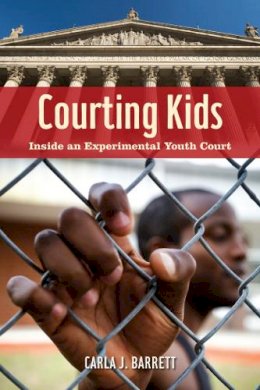
Stock image for illustration purposes only - book cover, edition or condition may vary.
Courting Kids
Carla J. Barrett
€ 45.72
FREE Delivery in Ireland
Description for Courting Kids
Paperback. Reflects the costs, challenges, and consequences the "tough on crime" age has had, especially for male youth of colour Series: Alternative Criminology. Num Pages: 220 pages, 13 tables. BIC Classification: 1KBBEY; JFSP2; LNFQ. Category: (P) Professional & Vocational. Dimension: 228 x 154 x 17. Weight in Grams: 346.
Despite being labeled as adults, the approximately 200,000 youth under the age of 18 who are now prosecuted as adults each year in criminal court are still adolescents, and the contradiction of their legal labeling creates numerous problems and challenges. In Courting Kids Carla Barrett takes us behind the scenes of a unique judicial experiment called the Manhattan Youth Part, a specialized criminal court set aside for youth prosecuted as adults in New York City. Focusing on the lives of those coming through and working in the courtroom, Barrett’s ethnography is a study of a microcosm that reflects the costs, challenges, and consequences the “tough on crime” age has had, especially for male youth of color. She demonstrates how the court, through creative use of judicial discretion and the cultivation of an innovative courtroom culture, developed a set of strategies for handling “adult-juvenile ” cases that embraced, rather than denied, defendants’ adolescence.
Product Details
Format
Paperback
Publication date
2012
Publisher
New York University Press United States
Number of pages
220
Condition
New
Series
Alternative Criminology
Number of Pages
220
Place of Publication
New York, United States
ISBN
9780814709450
SKU
V9780814709450
Shipping Time
Usually ships in 7 to 11 working days
Ref
99-50
About Carla J. Barrett
Carla J. Barrett is Assistant Professor of Sociology at the John Jay College of Criminal Justice.
Reviews for Courting Kids
"Readers will gain a sense of the history and initial purpose of the juvenile court, an understanding of the impact of accountability-based public policies, the tools used to facilitate accountability, such as legislative and judicial waivers, and the research that, to date, has found that these policies have not necessarily reduced recidivism or deterred criminal conduct. In the end, Courting Kids is not just about youth and a specialized court in New York; it is about all youth, everywhere"
Political Science Quarterly
"Explores the experiment in child-saving undertaken by the Manhattan Youth Part of the New York criminal court system and considers the insights it offers about the persecution of youth offenders."
Journal of Economic Literature
"An articulate and intelligent ethnographic study."
Sarah Ciftci
Current Issues in Criminal Justice
"An impressive and important book. Meticulously researched and well written the book offers an insightful account of the way one court adapted to the legal effort to try juvenile offenders as adults."
Austin Sarat,author of Life without Parole "This insightful ethnography tells a compelling story of injustice, humanity, and sufferingof a judges struggle to do right despite challenging circumstancesand in the process offers a powerful critique against transfer to criminal court."
Aaron Kupchik,author of Homeroom Security
Political Science Quarterly
"Explores the experiment in child-saving undertaken by the Manhattan Youth Part of the New York criminal court system and considers the insights it offers about the persecution of youth offenders."
Journal of Economic Literature
"An articulate and intelligent ethnographic study."
Sarah Ciftci
Current Issues in Criminal Justice
"An impressive and important book. Meticulously researched and well written the book offers an insightful account of the way one court adapted to the legal effort to try juvenile offenders as adults."
Austin Sarat,author of Life without Parole "This insightful ethnography tells a compelling story of injustice, humanity, and sufferingof a judges struggle to do right despite challenging circumstancesand in the process offers a powerful critique against transfer to criminal court."
Aaron Kupchik,author of Homeroom Security
